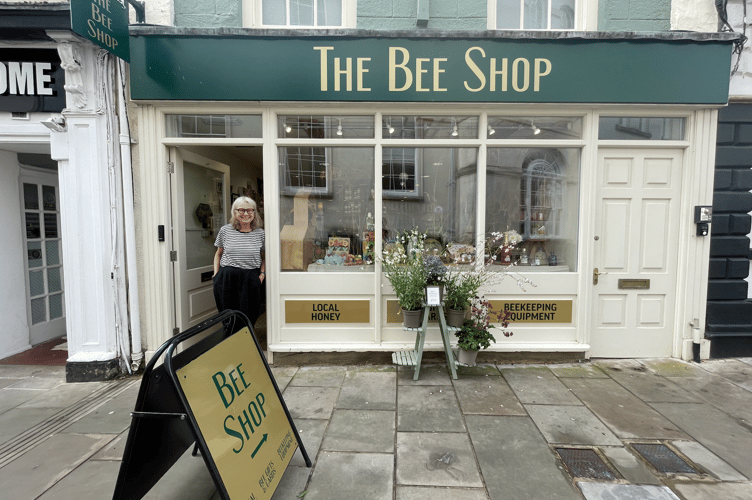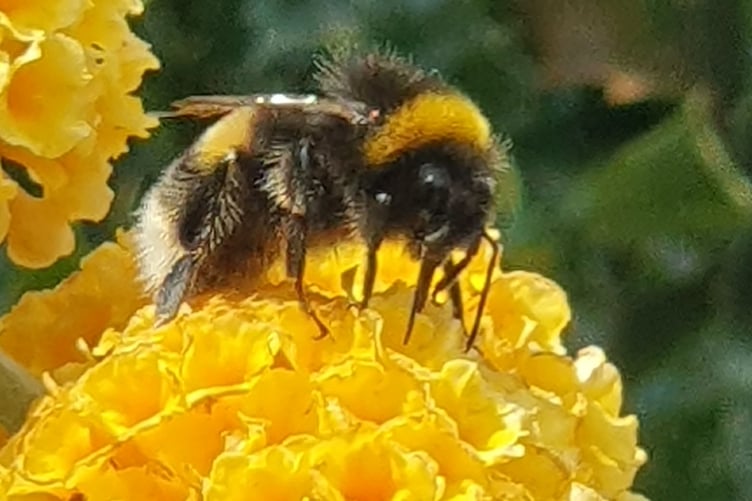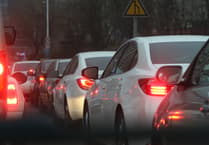POLLINATORS are a crucial part of our ecosystem, but they have been facing difficulty in Wales in recent years and with over 1,500 pollinators species declining and facing extinction, the concern for their welfare continues to grow.

Nicola stresses the importance of bees and their crucial impact on society, spending much of her career learning about bees and helping other countries value the importance of these pollinators.
Her charity, Bees for Development was founded in 1993 and after the Bee shop opened in 2010, Nicola was awarded an MBE for her tireless effort in growing this charity and helping other people recognise the importance of beekeeping and biodiversity.
Bees harvest and nourish society, according to Nicola: “You can’t have bees without flowering plants, and you can’t have flowering plants without bees - they depend on each other.”
Monmouth became the first bee town after Monmouthshire County Council, Bees for Development and Monmouth Town Council, came together to act on the importance of maintaining the sustainability of the town whilst protecting the pollinators which add so much nutrition and benefits to the community.
The charity had a strong influence, even catching attention from beekeeper, Queen Camilla who is the president.
The extinction of butterflies, bees and other pollinators would have an effect on society and the environment, and after discussing this with people who are experts in this industry, they provided constructive advice we can take into account to ensure we are looking after the environment including pollinators which hugely contribute to society.

When Nicola founded Bees for Development, she visited less economically developed countries because in some of these areas were the best places for keeping bees without realising.
Nicola shared her knowledge of the vital importance of bees and helped them earn an income from bee keeping whilst protecting the environment.
“We started work primarily in Tanzania, in the forests and that's where I realised how important it was in people's livelihoods.”
“Then we gradually worked in more of the poorest places on Earth, Africa, Asia South America, Caribbean, Russia all over the place.”
Pollinators play a crucial role in society as without them we could face food shortages. Crops such as fruit, plants and nuts rely on pollinators for reproduction and without pollinators there would be a shortage of crops, leading to reduced availability and an increase in prices.
With this considered this could affect low-income communities making nutritious food less accessible.
The decline in pollinators would have a severe effect on the economic system, with farmers being among those most concerned. Due to inheritance tax, farmers could lose their jobs especially in rural areas where they might rely on pollinators to nourish their crops.
In the news currently, inflation has increased to 4.5 per cent in June 2025, which means accessing food could be challenging, especially if prices increase in the event of a food shortage.
Another concern which could arise from the decline in pollinators could be the disruption of the food chain, as it could affect our ecosystems which depend on pollinated plants leading to a threat to wildlife.
Herbivores rely on crops as their food source. If there’s a shortage, people could struggle to find adequate nutrition leading to a decline in population.
Another issue which could arise is the potential health effects. With reduced nutrients it could lead to people’s diets being less diverse as people won’t be receiving the vitamins, nutrients and antioxidants they need for a full, well-balanced diet.
Elliot Water, Project Officer from Nature isn’t Neat, said: “Pollinators are really crucial to humans as well, not just honeybees, there's so many different varieties of bees and butterflies.”
“Moths are one of the best pollinators that we have in the UK, there are many more than butterflies.”
Moths are vital for nocturnal pollination. Bees and other insects pollinate during the day and according to the BBC a study also proved moths carry more pollen and visit a wider selection of plants.
Elliot spoke on some key advice which we can follow to help protect pollinators:
- Manage our spaces differently, allowing plants/flowers to bloom.
- There are so many flowers in hedge rows- you get tons of pollinators from them, they should be cut as little as possible.
- Another aspect is shelter. We might only care about the plant when the flower is flowering whereas you have butterflies which lay their eggs directly on a variety of plants so it’s important to take extra care.
- Be mindful of what chemicals we put out to the environment including pesticides. There are many types of pesticides which are harmful to the environment including: neonicotinoids and herbicides.
Lynne Allbutt, an expert in the gardening world spoke on her views of why it’s important to have pollinators around.
“In a nutshell if we have no pollinators, we have no food.”
“There has definitely been a decline over the years. Motorcycle helmet visors and car windscreens are testament to that. I have noticed far fewer in the garden too, especially this year.”
“As individuals we can ‘support’ pollinators by making sure they have what they need to thrive. Like us, that is essentially food, water and shelter. Plant nectar rich plants in your garden, provide water for pollinators to drink.”
“Bees and butterflies need very shallow water as the surface tension of deep water won’t take their weight and don’t be ‘too tidy’ in the garden so that they all have somewhere to safe to reside even as caterpillars and larvae.”
“The single most important thing anyone can do is to gain knowledge about these issues- we live in an information rich society now. There is no excuse for ‘not knowing.’





Comments
This article has no comments yet. Be the first to leave a comment.